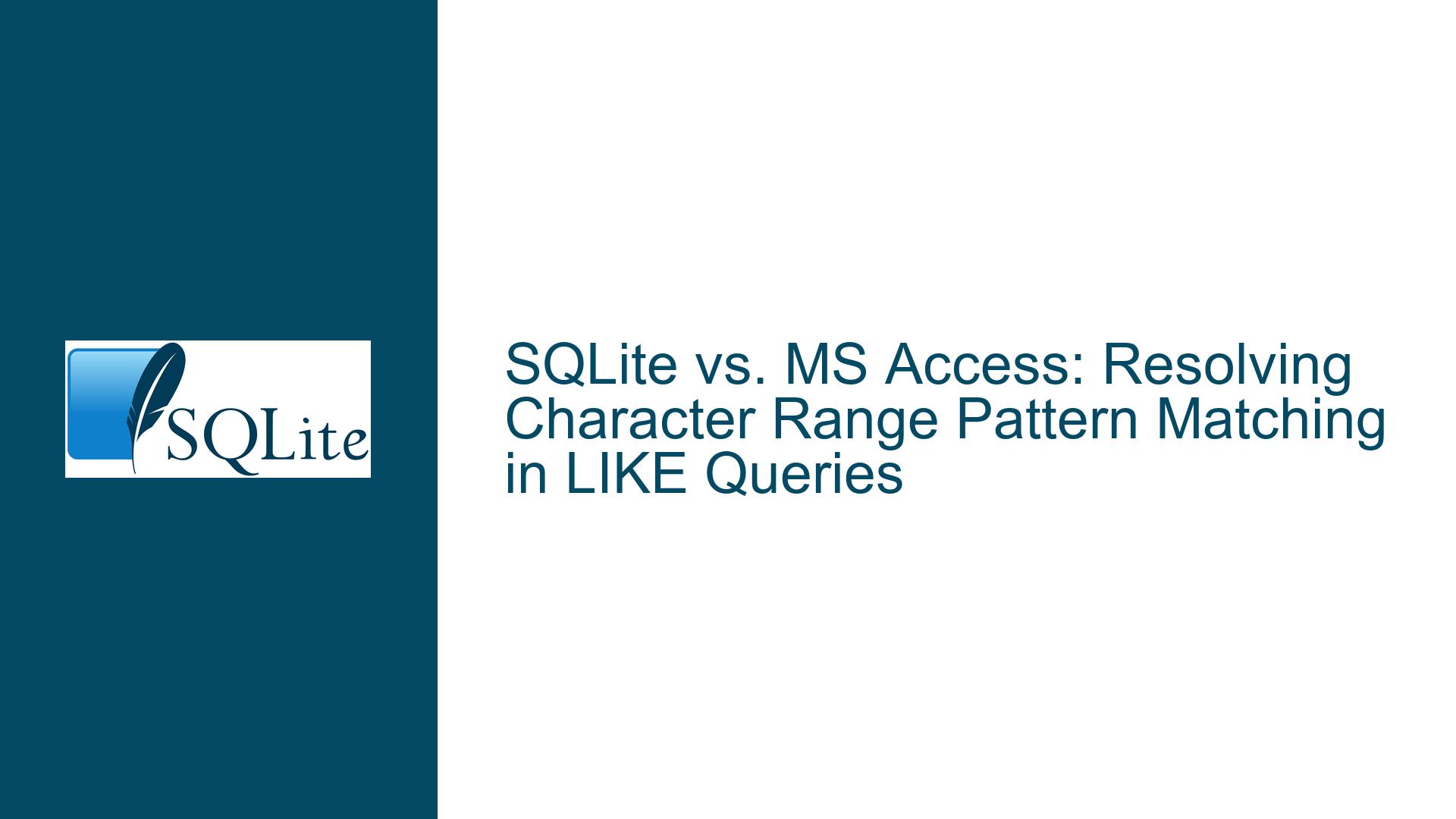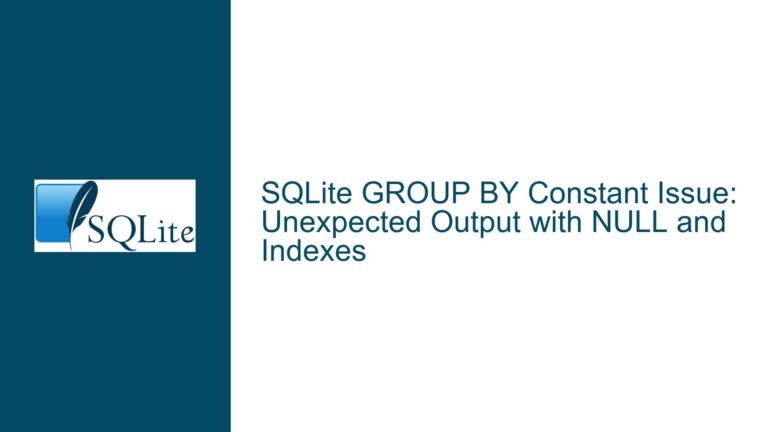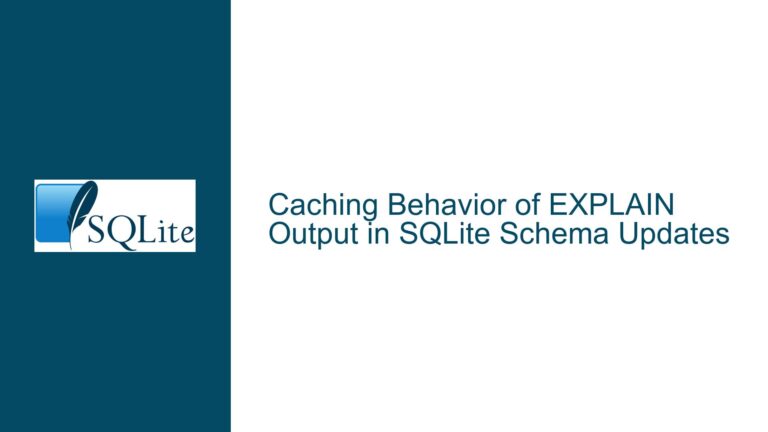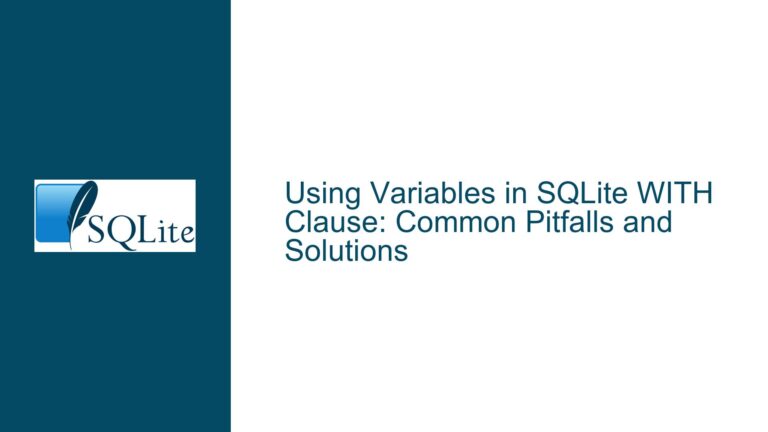SQLite vs. MS Access: Resolving Character Range Pattern Matching in LIKE Queries
Understanding SQLite’s Pattern Matching Limitations for Character Ranges
Issue Overview: Incompatibility of Character Range Syntax in LIKE Queries
The core challenge arises when migrating SQL queries from Microsoft Access 97 to SQLite3, specifically involving pattern matching with character ranges. In MS Access, the LIKE operator supports bracket notation ([a-e], [abcde], [^xz]) to define ranges of characters to match or exclude. For example:
WHERE f LIKE '%[a-e]%'matches any text containing characters betweenaande.WHERE f LIKE '%[^xz]%'excludes entries containingxorz.
In SQLite, however, the LIKE operator does not recognize bracket syntax for character ranges. Instead, SQLite’s LIKE only supports two wildcards:
%(matches zero or more characters)._(matches exactly one character).
When executing the same MS Access-style LIKE queries in SQLite, the bracket expressions are treated as literal characters. For instance, LIKE '%[a-e]%' will search for the exact substring [a-e] in column f, not for characters within the a to e range. This discrepancy leads to queries returning no results, even when data exists that should logically match the intended pattern.
The user’s application must support both SQLite and MS Access 97 databases, necessitating a unified approach to handle pattern-matching syntax across these systems. The goal is to replicate MS Access’s behavior in SQLite while maintaining compatibility with legacy Access databases.
Possible Causes: Divergent Pattern Matching Implementations
Three primary factors contribute to the mismatch in query results between MS Access and SQLite:
Syntax Differences Between
LIKEImplementations
MS Access extends the ANSI SQLLIKEoperator with non-standard syntax for character ranges ([a-e]) and exclusions ([^xz]). SQLite adheres strictly to standardLIKEbehavior, which lacks these extensions. Consequently, bracket expressions in SQLite are interpreted literally rather than as range specifiers.Case Sensitivity and Collation
MS Access defaults to case-insensitive comparisons forLIKEqueries, whereas SQLite’sLIKEis case-insensitive only for ASCII characters when using the defaultBINARYcollation. This difference can further complicate cross-database compatibility if the application does not explicitly handle case sensitivity.Misuse of
GLOBas a Substitute
SQLite’sGLOBoperator supports Unix-style pattern matching, including bracket ranges ([a-e]) and negation ([^xz]). However,GLOBuses*and?as wildcards (instead of%and_) and is case-sensitive by default. Attempting to useGLOBas a drop-in replacement forLIKEwithout adjusting wildcards or collation will fail.
Troubleshooting Steps, Solutions & Fixes
1. Replacing LIKE with GLOB for Character Range Matching
SQLite’s GLOB operator supports bracket syntax for character ranges and exclusions, making it the closest equivalent to MS Access’s LIKE behavior. However, adjustments are required:
Wildcard Conversion
Replace%with*and_with?in patterns.
Example:-- MS Access SELECT * FROM t WHERE f LIKE '%[a-e]%'; -- SQLite equivalent with GLOB SELECT * FROM t WHERE f GLOB '*[a-e]*';Case Sensitivity Handling
GLOBis case-sensitive. To replicate MS Access’s case-insensitive matching, apply theCOLLATE NOCASEclause:SELECT * FROM t WHERE f GLOB '*[a-e]*' COLLATE NOCASE;Negation Syntax
Use^instead of!or[^]for exclusion:-- Exclude 'x' and 'z' SELECT * FROM t WHERE f GLOB '*[^xz]*';
2. Implementing Cross-Database Pattern Matching
To maintain compatibility between SQLite and MS Access, the application must dynamically generate queries based on the active database. This involves:
Database Detection
Identify the database type at runtime (e.g., via connection properties or metadata).Pattern Translation
Convert bracket ranges and wildcards betweenLIKEandGLOBsyntax. For example:def translate_pattern(pattern, db_type): if db_type == 'sqlite': return pattern.replace('%', '*').replace('_', '?') elif db_type == 'access': return pattern.replace('*', '%').replace('?', '_') return patternUnified Case Handling
Force case-insensitive comparisons in SQLite usingCOLLATE NOCASE:SELECT * FROM t WHERE f LIKE '%abc%' COLLATE NOCASE; -- SQLite
3. Advanced Alternatives: Regular Expressions and User-Defined Functions
For complex pattern-matching requirements, consider these approaches:
SQLite’s
REGEXPOperator
Enable the REGEXP extension (requires compiling SQLite with-DSQLITE_ENABLE_REGEXP) and use POSIX-style regular expressions:SELECT * FROM t WHERE f REGEXP '[a-e]'; -- Matches any 'a'-'e'Custom Collations or Functions
Create a user-defined function (UDF) to handle MS Access-style pattern matching:sqlite3_create_function(db, "access_like", 2, SQLITE_UTF8, NULL, &access_like_udf, NULL, NULL);SELECT * FROM t WHERE access_like(f, '%[a-e]%'); -- Custom implementationHybrid Query Generation
Use application logic to decompose bracket ranges into multipleLIKEclauses:SELECT * FROM t WHERE f LIKE '%a%' OR f LIKE '%b%' OR f LIKE '%c%' OR f LIKE '%d%' OR f LIKE '%e%';
Summary of Key Adjustments
| MS Access 97 Syntax | SQLite Equivalent | Notes |
|---|---|---|
LIKE '%[a-e]%' | GLOB '*[a-e]*' | Use COLLATE NOCASE for case insensitivity. |
LIKE '%[^xz]%' | GLOB '*[^xz]*' | Negation with ^, not !. |
LIKE 'b[ae]ll' | GLOB 'b[ae]ll' | Replace LIKE wildcards with GLOB wildcards. |
| Case-insensitive matching | COLLATE NOCASE | Explicitly required in SQLite. |
By systematically addressing syntax differences, case sensitivity, and cross-database compatibility, applications can achieve consistent pattern-matching behavior across SQLite and MS Access 97.






